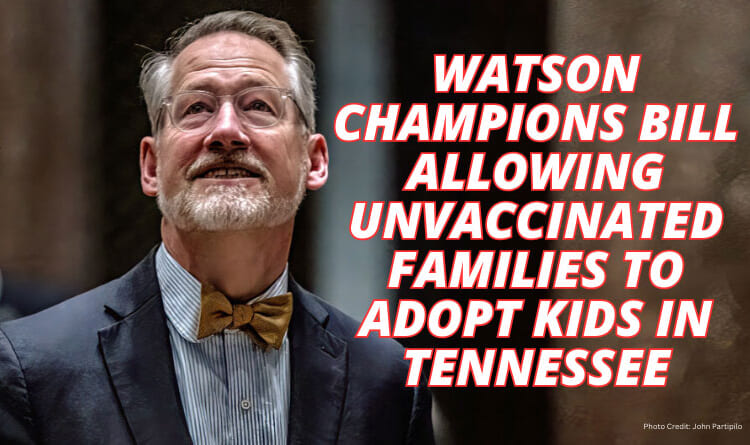Photo: Sen. Bo Watson says a requirement for foster families of infants to be vaccinated against the flu and whooping cough is discriminatory. Photo Credit: John Partipilo
By Anita Wadhwani [Tennessee Lookout -CC BY-NC-ND 4.0] and The Tennessee Conservative Staff –
A bill, sponsored by Senator Bo Watson (R-Hixson-District 11) and Representative Ron Gant (R-Piperton-District 94) would end current vaccine rules for families fostering or adopting babies under 18 months old and kids with significant medical needs, based on the families’ moral or religious objections.
The bill, that is advancing in the Tennessee legislature, would eliminate flu and whooping cough vaccine requirements for adoptive families and foster families caring for infants and medically fragile kids.
The summary of SB2359 / HB1726 reads as follows: As introduced, prohibits the department of children’s services from requiring an immunization as a condition of adopting or overseeing a child in foster care if an individual or member of an individual’s household objects to immunization on the basis of religious or moral convictions. – Amends TCA Title 4; Title 36; Title 37 and Title 71.
Watson said the bill is intended to remove discriminatory requirements and expand Tennessee’s pool of foster and adoptive families.
“Under the current law, it disqualifies families from fostering and/or adopting a child in state care based on their immunization status, which I find to be discriminatory and unfair” Watson said during Tuesday’s Senate Judiciary Committee hearing.
“Why would we in any way hinder good families, safe families, who desire to foster and/or adopt these babies?,” he asked.
Watson said, “To our account, there have been five states that have acquired waivers on their (vaccination requirement) models. The model is not binding to the state. States should and could choose for themselves.“
The measure has raised concerns within the Department of Children’s Services, whose deputy general counsel warned lawmakers about “health repercussions for that vulnerable population” should the measure become law.
We’re not only talking about (children) under-18 months,” said Sammi Maifair, DCS’ attorney. “This would also apply to children with special medical needs — so immunocompromised children, children who are vulnerable anyway — so being exposed to those diseases could be severely detrimental to that population particularly,” she said.
DCS currently has no shortage in families who wish to adopt or foster infants and are willing to comply with current vaccine requirements, Jim Layman, executive director of legislation and policy for DCS, told lawmakers.
Watson said, “Many people would be surprised to see me carrying this legislation but at the end of the day, I disagree with the argument that we have enough families. There are a lot of people that are willing to foster an NAS baby, a meth-addicted baby. Those are very challenging fostering infants. Everybody wants to foster the health child, there are plenty of folks to do that but what about the family that’s willing to foster the NAS baby….there are a lot of kids like that.”
Watson noted that there are challenges in finding families willing to take on babies exposed to drugs in utero or kids with disabilities.
Potential foster and adoptive parents opposed to vaccines are often well-suited to provide good homes to kids, according to Watson.
“The demographic of this group of individuals that perhaps tend to view the world a little bit different than the rest of us – they are highly educated and they’re affluent. They have the resources to help care for these children and they are very well-educated. Look at the studies on the folks who are in the vaccine-concerned cohorts,” Watson stated.
Sen. London Lamar, D-Memphis, noted she had received a whooping cough vaccine and flu shot while pregnant to protect her son.
“Is there any accountability put in place if the child is severely sick or dies from either the flu or whooping cough that they contracted from a family who didn’t get vaccinated?” she asked.
Watson responded that the scenario would be the same as if a child is physically abused in foster care. “I think the same kind of standards exist there that would exist under these statutes,” he said.
The bill has potential to jeopardize federal funding. This Department of Children’s Services receives $252.5 million in federal foster care funding. As condition of receiving federal dollars is for the state to submit a foster care and adoption plan for approval by the U.S. Health and Human Services department. Those plans must meet guidelines by the Administration for Children and Families that say all caregivers must be up-to-date on whooping cough and annual influenza vaccines. States that wish to veer from those guidelines must get federal permission.
The bill was passed by the Senate Judiciary Committee, with Lamar the only “no” vote. It will move onto a calendar committee before heading to a full vote on the Senate floor.
***Note from The Tennessee Conservative: this article has been edited for writing style and length per The Tennessee Lookout’s republishing guidelines.



